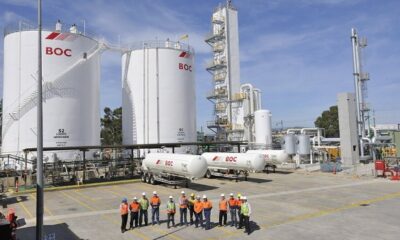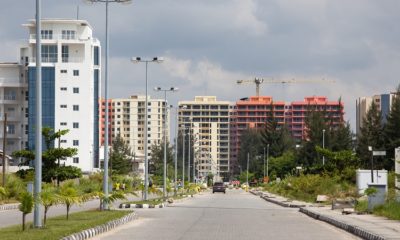Today we shed some light on the recently published Nigeria Development Update by the World Bank titled “The Continuing Urgency of Business Unusual”. The publication provides an overview of recent social and economic developments in Nigeria, as well as forward-thinking views and recommendations on select economic and policy challenges.
The report covers the weakening macroeconomic indicators despite higher oil prices and an analysis on economic and policy reforms that could support macroeconomic stability in the long-term.
For national output, the World Bank expects growth at 3.4% y/y and 3.2% y/y in 2022 and 2023 respectively. The improvement in growth prospects is on the back of higher oil prices as well as sustained growth in agriculture and a robust recovery in services (mainly telecommunications, and financial services). These sectors posted growth above prepandemic levels in recent quarters. The 3.4% y/y GDP growth forecast is in line with our projection for same indicator in 2022.
Although growth prospects have improved, domestic macroeconomic indicators have weakened. This can be attributed to high inflation, heightened global risks on the back of the Russia-Ukraine crisis, the impact of monetary tightening by central banks in advanced economies, national security and policy direction concerns due to the upcoming 2023 elections.
Based on the report, between 2020 – 2021, the “inflation shock” alone is estimated to have pushed c.8 million more Nigerians below the poverty line. The food inflation rate has been a major driver of Nigeria’s headline inflation. Given its importance in the production of staples such as bread and pasta, the shortage of wheat triggered by the Russia-Ukraine crisis has contributed to steady upticks in food inflation. As at April ‘22, the price of wheat flour had
increased by 36% y/y.
The World Bank provides some recommendations to combat rising inflation in the shortterm. They include – (i) fully reopen land borders to trade and remove fx and import restrictions on staple foods and medicines (ii) signal the CBN’s commitment to price stability as the primary goal and reduce subsidized lending to medium and large firms (iii) reduce CBN overdrafts for fiscal deficit financing to their legal limit (5% of previous year’s actual collected revenue). Our estimate for inflation for end-2022 is 20.6% y/y.
On fiscal, despite higher oil price, the World Bank expects oil revenue to be lower in 2022. This is mainly due to increased petrol subsidy payment and low oil production. The estimated total cost of petrol subsidy was revised from the initial N443bn to N4trn this year. Based on data from the NBS, average crude oil production (condensates inclusive) in Q1 ’22 was 1.5mbpd, below the revised FGN 2022 budget oil production benchmark of 1.6mbpd.
Nigeria’s oil production has been hampered by production shut-ins as a result of crude oil theft, vandalism, prolonged repairs, and community issues.
Regarding trade, the report highlights Nigeria’s path towards greater integration and policy reform through the active participation in African Continental Free Trade Area (AfCFTA) negotiations and its efforts to develop a domestic implementation plan. The World Bank notes that the AfCFTA implementation will require substantial preparation and engagement across sub nationals, the private sector, and other stakeholders.
From our vantage point, to maximise the benefits of the AfCFTA agreement, Nigeria’s manufacturing sector needs to be strengthened. The cost of transportation, power and logistics which is fundamental to production and competitiveness is significantly high and deepens cost of production for manufacturers.
Furthermore, local manufacturers need to significantly improve their service delivery and product standards if they are to be competitive in a burgeoning intra-continental marketplace. Nigeria’s manufacturing sector accounts for c.10% of total GDP. This compares with 11% in South Africa, 15% in Egypt and 13% in Ghana. Similar to the views expressed in this World Bank update report, we note that a handful of reforms are essential to boost domestic manufacturing competitiveness.
These include creating an enabling regulatory environment for technology to be incorporated in trade operations; developing a cohesive strategy to formalise the informal sector which should also focus on reducing government bureaucracies, improving fiscal policies and accountability, while providing training, technology, and access to financial services. Strengthening customs and border patrol to minimize smuggling and dumping of substandard products is also important.
The World Bank highlights the importance of further continental integration to enhance competitiveness of Nigeria’s manufacturing sector. Furthermore, given the growing trend of investors seeking green opportunities, the report suggests that Nigeria can remain competitive by reducing gas flaring, venting, and fugitive methane emissions.
Based on the report, Nigeria’s remittance flows has recovered to pre-pandemic levels. In 2021, remittances to Nigeria grew by 11.2% to USD19bn.
Since some transactions pass through informal channels, the actual amount of remittance flows into the country is arguably higher. We note that there was increased usage of official channels by Nigerians in diaspora in 2021, this contributed to the growth recorded in remittance inflow.
Furthermore, it is likely that the CBN’s Naira-4-Dollar policy assisted with boosting remittances in the period under review. There was a strong need among migrants to assist their respective families in Nigeria due to the economic downturn triggered by the coronavirus pandemic, this also contributed to remittance growth during this period. According to local media, 70% of remittances from Nigerians in the diaspora went into family support, while 30% was channelled towards investments in 2021.


 Billionaire Watch3 weeks ago
Billionaire Watch3 weeks ago
 Startups4 weeks ago
Startups4 weeks ago
 News4 weeks ago
News4 weeks ago
 News4 weeks ago
News4 weeks ago
 Bitcoin4 weeks ago
Bitcoin4 weeks ago
 Naira4 weeks ago
Naira4 weeks ago
 Forex3 weeks ago
Forex3 weeks ago
 Treasury Bills4 weeks ago
Treasury Bills4 weeks ago
























